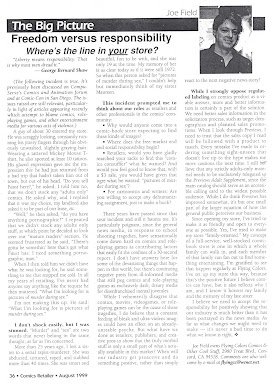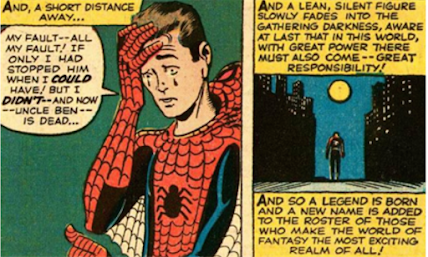This was originally published in the November 1999 issue of Comics & Games Retailer magazine.
The Strange World Beyond 2000
The Future Is More
Questions Than Answers
by Joe Field
"A hundred times a day I remind myself that my inner and outer life depends on
the labors of others, living and dead, and that I must exert myself in order to give
in the same measure as I have received and am still receiving."
Albert Einstein, 1931
Do you save your copies of Comics Retailer for future reference? If you don't,
this may be one for the time capsule. The assignment given to your dedicated
*CR* columnists for this special issue is to address the prospects of independent
retail stores as they head into the 21st century. Sounds to me like an invitation to
delayed laughter.
I've always gotten a real kick out of reading comics like *Mystery In Space* and
*Tales To Astonish*, with sci-fi stories of the "future", especially the old comics I've
run into over the last decade or so with story titles such as "The Strange World of
1980" . But the future? I sure don't know how this whole gig is going to shake out.
With history and experience as our primary guides, the possibilities of that
nebulous time ahead are very intriguing. Heck, I'm still mildly excited by Marvel's
and DC's advance copy programs allowing me to see some of next week's
comics this week, so I suppose I'm an easy mark when the topic is the future.
Let's start, though, with a few of the more serious challenges comics retailers face
on the brink of the 21st century:
An Onslaught of New Competition
The whole on-line phenomenon seems to be leading to an increasingly isolationist society in which consumers may never have to leave their homes. As the growth of internet retailing continues, the challenge for retailers, in addition to having the products consumers will want, is having the kind of stores that will motivate people to come out of their future caves and actually socialize with others who share their comics fanaticism.
A curious recent trend has on-line retailers starting to enter the world of "brick and mortar" retailing, as a way to get in front of the public. Many professional web-watchers agree that even though traditional retailers not adopting an on-line strategy may get killed in the new economy, the reverse may also be true. E-retailing is expected to reach close to $30 billion in 1999, but that's still less than 3% of the traditional retail market.
Competition isn't limited to computers, though. All media will be aggressively vying for consumer attention. If we wonder what the next ten years might mean for new competition, we need only look back at the last ten, which brought us an array of technological advancements in entertainment such as virtual reality, HDTV and DVD, in addition to the ubiquitous Internet. Expect new media competition to be even more fierce. The explosion of on-line, downloadable entertainment could drastically cut into our relatively antiquated, printed medium.
The World Is Shrinking
As living, working and selling space become more and more expensive, will consumers still want to stockpile large collections of paper? This society is more consumeristic and acquisitive than ever, but will "he who dies with the most toys" really win? I'd expect the number of comic book *collectors* to further decrease, even as I expect the number of readers to increase. The print medium has been down for the count for quite some time, but still seems resilient enough for the long term. Print-on-demand technology will definitely play a large role in the traditional
book market, but it's doubtful to have much of an impact in our market.
Adapting to Change
In addition to new technology, retailers will need to constantly roll with the punches to meet the changing demands of our customers, as well as shifting demographics and lifestyles. The "aughties" will see a boomlet for kids in the 8-18 age group. The challenge is to prepare now to serve them with new products and services.
I'm also hoping that new formats will allow an expansion of the kinds of products we'll be able to sell in the future remnants of the direct market. As an example, I'd love to see DVDs loaded with classic comics and interviews with the creators of those comics, but the quick obsolescence of formats may mean the inevitable home for such an archival project will be the Internet.
Capitalist or Huckster?
Any retailer who came into this business prior to 1990 and was able to turn a profit through the years of upheaval ('92-'95) and is still thriving on the brink of the 21st century, is someone showing a resilient ability to survive. Still, the challenge is for us to show that we're in a vital, above-board business and that we're not scam artists.
As retailers, will we try to sell consumable products fairly, representing those products for their intended purpose of entertainment? Or are we mercenaries who will continue to flit from fad to fad, burning bridges to customers with every unconscionable price gouge?
Levelling the Playing Field
Comics retailers need to prove we deserve equal say in charting the course of this industry. Obviously, we vote with our orders every month, but I'd like to see retailers become more a part of the whole process, along the lines of DC's progressive Retailer Representative Program. I'm certain other publishers and suppliers would benefit from the solid ideas and street-level experience retailers can bring to the discussion of charting the future course of this business.
There are far more challenges ahead than those I've laid out, and they all make our mere survival seem precarious. There is a positive flip-side, though. As independent business owners/managers, we have some empowering and distinct advantages over larger corporate retail operations.
They See It Here First
Most mass market character phenomena, from Superman to Star Wars to Batman to Pokemon (yes, even frustrating Pokemon), got their initial boosts from our specialty market. At our street level, we're first to find out what consumers want. If we listen to our customers, we usually can get a jumpstart of at least several months before the chains react. On first blush, this may seem counter to my frequent tirades against fad-surfing, but the constant here is that each of these phenomena have strong ties to our core comics product.
You Are Your Own Boss
As independents, we don't have to deal with the frustrations of big business red tape. Many corporations with centralized operations can't react locally in a quick and effective way. Also, chain store managers come and go, but dedicated small business owners can build long-term relationships and be more active and visible in their communities.
Critics-R Us
Most independent specialty retailers know the holes in their operations. As I look at my store, I try to make some improvement every week, whether it's adding a new dimension to our special order service or making the displays work more efficiently to sell more product. As self-critics, we can take the up-close look at operations, quickly making the necessary adjustments that managers of 30,000 square foot, 100 store chains can't.
No Suits, No Ties, No Screaming Bosses
With every week that passes, we should be learning what it takes to make it in this business. Or not. Maybe the main allure of having your own business is just wanting to get by and forget the grand notions that go with growth and progress. Maybe you're in this business to be low-key and to cut the stress in your life, and that's OK, too.
Most of us chose this line of work because we like what we sell. As this industry's average customer seems to keep getting older, I feel like I'm aging at an even faster rate. I personally feel more like a nostalgist every day. Sure, I still love what I do. I love to nurture new readers, guiding them to buy only what they like while teaching them about the great talents of the past.
We can carve our businesses to suit our personal interests. Our enthusiasm may ultimately prove to be our primary asset, as we help to build a more positive future for the art and commerce of comics. And while that may be the most daunting challenge, I'd like to think we're up to it. After all, I don't want to look back at this column years from now and discover I was wrong about everything.
(Joe Field owns Flying Colors Comics & Other Cool Stuff, 2980 Treat Blvd., Concord CA 94518. E-mail your comments to Joe@flyingcolorscomics.com. The opening quote is from "The Complete Idiot's Guide To Understanding Einstein" by Gary F. Moring, Alpha Books, and is highly recommended. I asked the author what he could tell me about Einstein that would personally interest me. He responded that he felt Einstein would have been a big comics' fan. The way Al's mind worked allowed him to engage the black-and-white of mathematical principles with the amazing concepts that guided him to his best work, much the same way comic fans use cognitive and interpretive skills simultaneously.)




